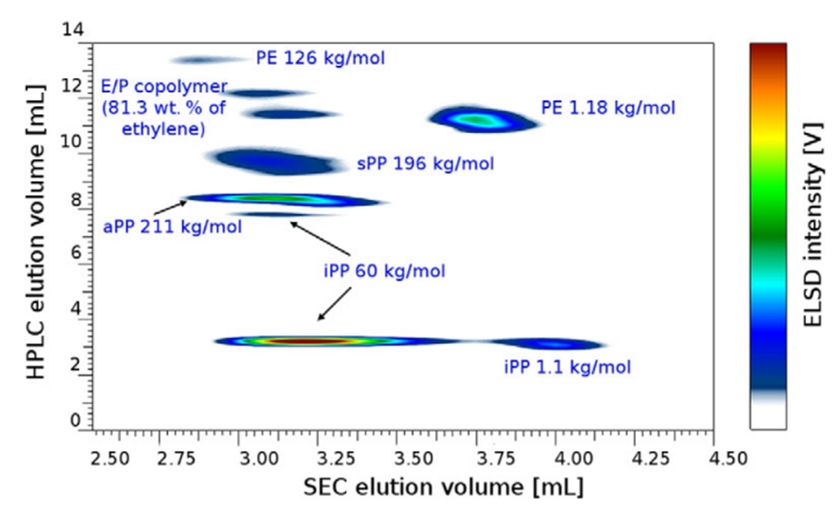Quantitative molecular characterization of polyolefin recyclates
Polyolefin waste is largely only recycled thermally. Material downcycling dominates here. From an economic and legislative point of view, more upcycling, i.e. the use in product categories of equal or higher value, is urgently required. However, information on the molecular structure of polyolefin recyclates (PORez) is still lacking. Researchers from the Fraunhofer LBF want to close this existing technology gap with the "Quantitative molecular characterization of polyolefin recyclates" project funded by the Industrial Collective Research (IGF) programme of the Federal Ministry of Economics and Climate Protection (BMWK).

A large number of components can be separated using 2D-LC, as this contour plot from the analysis of a solution blend of polyolefins illustrates. Valuable information on the processing and application properties of the material
Fraunhofer LBF
The project is based on 2-dimensional high-temperature liquid chromatography (HT-2D-LC). It is one of the most highly developed liquid chromatographic methods for characterizing polyolefins and is widely used by processing SMEs in the plastics industry. In the new "PORez" research project, the Fraunhofer experts will further develop the established HT-2D-LC-based method into an effective method for obtaining the necessary information for polyolefin recyclates.
New method for small and medium-sized enterprises (SMEs)
In particular, the development of protocols for representative sampling and sample preparation, the adaptation of the method parameters to the throughput requirements of SMEs and the handling of secondary phases will be addressed. The developed method will be refined using real samples. As part of this, a base of representative data on the relationship between molecular parameters and the origin and processing properties of polyolefin recyclates will be generated and made available for use in SMEs. The package is rounded off by best-practice examples to simplify the implementation of the new method as far as possible.
The results will significantly simplify the use of polyolefin recyclates as an alternative source of raw materials in SMEs and thus also strengthen the recycling market. Knowledge of the composition of recyclates or a compound made from them is not only essential for incoming and outgoing goods inspections, but also significantly increases the value of the goods and semi-finished products. With existing equipment infrastructure, the implementation of the results is low-threshold. Analytical service providers also benefit from the results if they incorporate them into their own method portfolio and provide targeted support to processing SMEs. This additionally promotes the transformation process towards the increased use of polyolefin recyclates.
Note: This article has been translated using a computer system without human intervention. LUMITOS offers these automatic translations to present a wider range of current news. Since this article has been translated with automatic translation, it is possible that it contains errors in vocabulary, syntax or grammar. The original article in German can be found here.
Other news from the department science

Get the chemical industry in your inbox
By submitting this form you agree that LUMITOS AG will send you the newsletter(s) selected above by email. Your data will not be passed on to third parties. Your data will be stored and processed in accordance with our data protection regulations. LUMITOS may contact you by email for the purpose of advertising or market and opinion surveys. You can revoke your consent at any time without giving reasons to LUMITOS AG, Ernst-Augustin-Str. 2, 12489 Berlin, Germany or by e-mail at revoke@lumitos.com with effect for the future. In addition, each email contains a link to unsubscribe from the corresponding newsletter.

























































